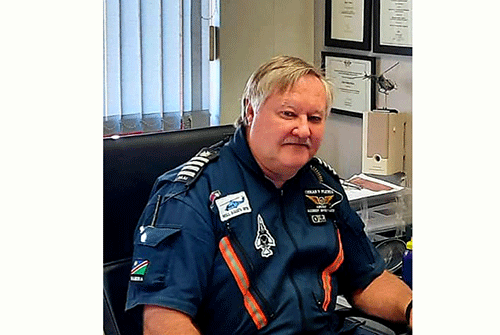From pilot to aircraft accident investigator
Air travel remains one of the safest modes of transportation, thanks to continuous improvements in risk management, technology and pilot training. Yet, things can still go wrong – even in the Namibian air space.
And when that happens, it is for Oskar V Plichta and his colleagues to find out what happened and prescribe remedial measures.
Plichta is a veteran pilot, who changed the course of his career to become an aircraft accident investigator.
For the past decade, he has been working under the Directorate of Aircraft Accident and Incident Investigations (DAAII) in the Ministry of Works and Transport.
Originally from Keetmanshoop, Plichta grew up around aeroplanes. His father was an active member of the Keetmanshoop Flying Club. Hence, it is not surprising that he earned his Private Pilot Licence (PPL) at age 17.
“After completing high school, I enrolled at university, but my studies were disrupted when I joined the military shortly afterwards. I continued to serve in the military for the next 18 years, but made an effort to keep my PPL valid and active. After resigning from the military, I decided to pursue aviation full-time, and in early 2000 I finally obtained my commercial flying licence. For the next 12 years, I flew all over southern Africa, and was appointed as chief pilot and operations manager at Desert Air before pursuing my current career as an aircraft accident investigator,” he explained.
Though he joined the public service in 2011, the DAAII has long recognised his valuable expertise in aviation safety. He recounted how the directorate first approached him regarding a possible vacancy in 2009.
“At the time that I was working at Desert Air, I also assisted the DAAII with minor accidents and investigations in my spare time. For two years, I patiently waited for the right opportunity and finally in 2011, I had my chance in front of the ministry’s review board, who officially appointed me as an aircraft accident investigator,” he said.
“I thought about a career change for quite some time, but it was only during the last few years as a chief pilot that I seriously started to consider my flying career and future in the aviation industry. I did not necessarily dream about working for the government, but when the opportunity came along, I certainly recognised it and set my focus accordingly.”
Aircraft accident investigators investigate, study and report on aeroplane crashes to determine how and why they happened. They cover a myriad of areas to establish the cause of aircraft accidents, and make recommendations to enhance aviation safety and prevent similar occurrences from happening again, Plichta noted.
He said the DAAII strictly works according to Annexure 13 of the Convention on International Civil Aviation, also known as the Chicago Convention, which reflects the standards and recommended practices covering aircraft accident and incident investigations.
“The Chicago Convention is the general framework or condition of the international Public Air Law, and acts as the Constitution or charter of the International Civil Aviation Organisation, to which Namibia is a signatory,” Plichta added.
Speaking about the challenging aspects of his job, he said “the most challenging investigations were always those where the pilot or crew were fatally injured. Without first-hand recollection, investigators heavily rely on technical evidence like radar tracking and radio communication to gain information for the investigation. Factually processing all relevant technical information per eyewitness accounts was one of the most challenging tasks as an investigator.”
Many professionals often have memorable moments that they love to remember and are happy to share with others. In Plichta’s line of work, this is hardly the case.
“Unfortunately, the moments that come to mind are not the best of memories at all. Out of all the investigations I completed and all the accident scenes I visited, the accidents that stuck with me most were those where the crew and/or passengers burned to death and where good friends or industry acquaintances were fatally injured,” he recounted.
However, not all is gloomy about his work, because during his time at DAAII, he had the privilege to train and share experiences with leading experts in the aviation industry.
“I attended excellent training courses abroad, and was fortunate enough to attend the International Society of Air Safety Investigators’ Annual Conference in Iceland. ISASI was founded to promote air safety through the exchange of ideas, experiences and information on aircraft accident investigations, and the conference was attended by 300 international investigators who readily shared their stories and knowledge – a definite highlight in my career,” he continued.
The investigation of aviation accidents and incidents is a key element to improving flight safety. Plichta explained that contrary to common belief, accident investigations are not conducted to blame individuals. “The principal purpose of any investigation is to make a safety recommendation to the aviation industry to prevent similar accidents or incidents happening in future,” he said.
He noted that “extensive experience in the aviation industry is essential for any aspiring aircraft accident investigator. Also, your experience must be as either a commercial pilot, aircraft maintenance engineer or air traffic controller.
Newly appointed investigators need to complete a two-year training programme consisting of six months of on-the-job training, and 18 months of professional training in the UK, USA and Singapore. After completing the initial training, aircraft accident investigators have to complete compulsory recurring training every 18 months.”
Plichta is looking to retire with eagerness to enjoy his favourite pastime activities that are hunting, fishing and camping.
“For the time being, I am focused on educating future investigators in our directorate. Since my appointment in 2011, our government has spent roughly N$1.7 million on my training and qualifications. And I hope to invest and share as much knowledge as possible with the next aircraft accident investigators.”


